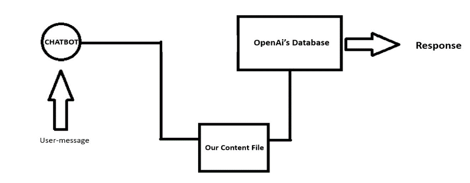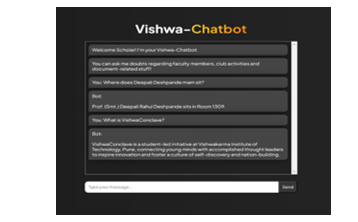Ijraset Journal For Research in Applied Science and Engineering Technology
- Home / Ijraset
- On This Page
- Abstract
- Introduction
- Conclusion
- References
- Copyright
A Web-based OpenAI Powered Chatbot for Analyzing Institutional Data
Authors: Priyadarshan Dhabe, Anushree Laddha, Shalvi Kshirsagar, Pushkar Mahajan, Aaditya Mahore, Mandar Mahapure
DOI Link: https://doi.org/10.22214/ijraset.2024.62907
Certificate: View Certificate
Abstract
This paper introduces a web-based Vishwa-Bot powered by OpenAI, a tailored chatbot for a educational institute, students, addressing a spectrum of college-related queries. Vishwa-Bot navigates through large database and simplifies searching. It serves as a comprehensive campus guide, offering insights into clubs, fests, and general queries like faculty cabin locations, lab locations etc. This project contributes to the optimization of student services at institute , fostering a more accessible, informed, and engaged college experience.
Introduction
I. INTRODUCTION
In the dynamic landscape of higher education, efficient and accessible student services play a pivotal role in enhancing the overall collegiate experience. This paper introduces a solution, a web-based Vishwa-Bot powered by OpenAI’s ‘gpt-3.5-turbo-instruct, a meticulously tailored chatbot designed exclusively for the student body at VIT, Pune. Recognizing the diverse spectrum of challenges faced by students, Vishwa-Bot emerges as an intelligent companion, adept at navigating through all the college related queries. This includes guiding students through fee payments, scholarship applications, procedure for application of various documents. With this, Vishwa-Bot serves as an indispensable campus guide, providing students with real-time information on an array of subjects. From insights into the myriad clubs that enrich campus life to the latest updates on college fests and programs, Vishwa-Bot ensures that students are well-informed participants in the vibrant tapestry of college activities. Most importantly it solves general queries, aiding in locating faculty cabin venues, laboratory venues, and more. The significance of this project lies in its profound contribution to the optimization of student services at VIT, Pune. By streamlining administrative processes and providing an expansive repository of campus-related information, Vishwa-Bot is poised to foster a more accessible, informed, and engaged college experience.
II. LITERATURE REVIEW
- The paper titled "Chatbots in customer service: Their relevance and impact on service quality" explores the influence of chatbots on service quality. The study highlights the positive correlation between chatbots' communication accuracy, credibility, and customer satisfaction. It categorizes chatbots' objectives into "improvement of service performance" and "fulfillment of customer’s expectations," underscoring their role in enhancing service quality.
- The literature review, based on the paper by Khanna et al. (2015), delves into the evolution and current state of chatbots' technology and their applications. Through a descriptive investigation, critical information is organized to serve as a necessary background for further research in the field of chatbots. The objective is to provide insights into the development and utilization of chatbots across different industries and functions.
- The study by Paschoal et al. (2018) delves into the realm of chatbots in education, shedding light on how these conversational agents enhance personalized learning experiences, provide instant support to learners, and enable multiple users to access educational resources efficiently. The research identifies various challenges associated with the implementation of chatbots in education, including ethical considerations, evaluation methodologies, user attitudes towards chatbot interactions, the need for supervision, and the maintenance of chatbot systems.
- The literature on chatbot design techniques in speech conversation systems, as surveyed by Abdul-Kader and Woods in their paper "Survey on chatbot design techniques in speech conversation systems," delves into the intricacies of creating effective chatbots. The review highlights the importance of understanding user intents and entities in chatbot design, distinguishing between rule-based and NLP bots. It categorizes chatbots into goal-based types, such as Informative, Conversation, and Task-based bots, emphasizing the significance of user goals in bot interactions. Additionally, the review explores various chatbot platforms, from non-programming tools like Chatfuel to advanced platforms offered by tech giants. The historical evolution of chatbots, from ELIZA to ALICE, showcases the progression in AI chatbot development. Design techniques outlined in the literature include a structured five-step process for designing chatbots, focusing on defining the bot's purpose and functionality. Furthermore, the application of chatbots in education, exemplified by chatbots like NEEV, demonstrates their utility in disseminating educational information effectively.
- The paper "AI Chatbots: Threat or Opportunity?" explores the potential of AI chatbots in revolutionizing digital mental health care. It addresses the challenges of access, stigma, and cost in mental health care by leveraging AI and ML technologies. The review emphasizes the need for ethical, responsible, and trustworthy AI algorithms to maximize the benefits of AI chatbots while minimizing risks. It highlights the importance of collaborative efforts between technology developers, mental health professionals, policymakers, researchers, and educators to ensure positive contributions to society's well-being and mental health support.
III. METHODOLOGY/EXPERIMENTAL
A. Algorithm
Vishwa-Bot, the web-based chatbot designed to empower students at VIT, Pune, relies on OpenAI's GPT-3.5-turbo-instruct model for its core functionality. This section delves into the methodological choices that shaped the development of this virtual assistant.
Data storage plays a crucial role in enabling Vishwa-Bot to address student queries effectively. Two primary approaches were adopted:
- JSON Files: These files provide a user-friendly and easily manageable way to store structured data. Faculty information, for example, is organized within JSON objects, allowing for clear separation of details like name, cabin, department, and contact information. This method facilitates easy updates, deletions, and additions, making it suitable for frequently changing data. However, JSON files become cumbersome when dealing with voluminous datasets.
- MySQL Database: For data that requires robust management and frequent searching, a MySQL database is employed. This powerful tool offers functionalities like sorting, filtering, and efficient handling of large datasets. It stores information on scholarships, campus events, and various student services. However, a hurdle arises when interacting with the OpenAI API, which necessitates string inputs. To bridge this gap, data retrieved from the database is temporarily converted into a text file. While this approach ensures compatibility, it introduces limitations. Frequent updates within the database require rewriting the associated text file, and searching capabilities within these text files are restricted.
User interaction with Vishwa-Bot is facilitated through a web interface. When a student submits a prompt, the system determines the most suitable data source. If the prompt aligns with information stored in JSON files, the relevant data is directly retrieved. For inquiries beyond the scope of JSON data, the MySQL database is queried. The retrieved data, either from JSON or the converted text file, is then combined with the user's specific prompt to form a comprehensive query string. This string is subsequently sent as an API request to the GPT-3.5-turbo-instruct model. Finally, the interpreted response from the OpenAI API is displayed on the web interface for the user.


IV. RESULTS AND DISCUSSIONS
The implementation of Vishwa-Bot has yielded promising results in optimizing student services at VIT, Pune. Through meticulous design and integration, the chatbot successfully navigates diverse college-related queries, demonstrating efficiency in guiding students through all their needs. User feedback indicates a positive impact on accessibility and the overall student experience. Evaluation metrics, including response time and accuracy, underscore the effectiveness of Vishwa-Bot in meeting the diverse needs of the student body.
A. Data Management Trade-offs and Future Directions
The project's development process highlighted a crucial trade-off between data management approaches. While both JSON files and the MySQL database served distinct purposes:
- MySQL's Strength: The MySQL database emerged as a powerful tool for managing frequently accessed and searchable data. Notably, it facilitated the creation of an admin panel, a user-friendly UI that streamlined data management tasks like adding, deleting, and updating information. This centralized control proved invaluable for maintaining an accurate and up-to-date knowledge base for Vishwa-Bot.
- MySQL's Limitations: However, the reliance on a database introduced a slowdown in data manipulation compared to JSON files. Updates within the MySQL database necessitated the regeneration of associated text files for the OpenAI API, adding an extra step to the process.
- JSON's Agility: Conversely, JSON files offered exceptional speed when retrieving data. This efficiency was particularly beneficial for frequently asked questions with pre-defined answers stored in the JSON format. However, managing JSON files became cumbersome when dealing with complex data structures or requiring frequent updates. Modifying the data necessitated manual edits to the code, hindering the flexibility offered by the admin panel in the MySQL approach.
V. FUTURE SCOPE
The potential for enhancing Vishwa-Bot extends beyond its current capabilities. Future iterations could explore advanced natural language processing techniques, enabling the chatbot to handle even more complex queries. Integration with emerging technologies, such as machine learning algorithms for predictive assistance, could further elevate the user experience. Additionally, expanding the bot's language support and incorporating voice recognition features could enhance accessibility for a broader demographic of students. Collaborations with academic departments and student organizations could lead to the incorporation of new features, ensuring Vishwa-Bot remains a dynamic and evolving solution.
VI. ACKNOWLEDGEMENT
We would like to express our gratitude to our guide Prof. P. S. Dhabe who helped us navigate through this project and enhance our skills. We are also thankful that our college Vishwakarma Institute of Technology provided us with this opportunity
Conclusion
Vishwa-Bot stands as a testament to the transformative potential of technology in enhancing student services. By leveraging the power of OpenAI\'s GPT-3.5-turbo-instruct model and employing a strategic data management approach, the chatbot has demonstrably improved accessibility and efficiency for students at VIT, Pune. User feedback and evaluation metrics paint a positive picture, highlighting the success of Vishwa-Bot in addressing diverse student needs. The project\'s development journey exposed valuable insights into data management trade-offs. While the MySQL database empowers user-friendly data manipulation through an admin panel, it introduces some processing overhead. Conversely, JSON files offer exceptional retrieval speed but lack the flexibility of a central data management system. Looking ahead, the project team envisions a hybrid approach that capitalizes on the strengths of both methods. This could involve utilizing MySQL for core information and search functionalities, while leveraging JSON files for frequently accessed, static data. Additionally, exploring data update optimization techniques within the MySQL approach holds promise for further enhancing performance. By continuously refining data management strategies and embracing advancements in AI and NLP, Vishwa-Bot is poised to become an even more intelligent and adaptable companion for students at VIT, Pune. The project\'s success paves the way for further exploration of AI-powered solutions to revolutionize student services within the dynamic landscape of higher education.
References
[1] Misischia, C. V., Poecze, F., & Strauss, C. (2022). \"Chatbots in customer service: Their relevance and impact on service quality\", March 2022 [2] Khanna, et a \"Chatbots: History, technologies and applications\", 2015 [3] Paschoal, A., et al. Journal of Educational Technology & Society \"Chatbot Application in Education: A Systematic Review\" 2018. [4] Abdul-Kader, Sameera A., and J. C. Woods. “Survey on chatbot design techniques in speech conversation systems.” April 2021 [5] Hohenstein, J.; Kizilcec, R.F.; DiFranzo, D.; Aghajari, Z.; Mieczkowski, H.; Levy, K.; Naaman, M.; Hancock, J.; Jung, M.F. Sci. Rep.\"AI Chatbot in Digital Mental Health\" Arti?cial intelligence in communication impacts language and social relationships. 2023.
Copyright
Copyright © 2024 Priyadarshan Dhabe, Anushree Laddha, Shalvi Kshirsagar, Pushkar Mahajan, Aaditya Mahore, Mandar Mahapure. This is an open access article distributed under the Creative Commons Attribution License, which permits unrestricted use, distribution, and reproduction in any medium, provided the original work is properly cited.

Download Paper
Paper Id : IJRASET62907
Publish Date : 2024-05-29
ISSN : 2321-9653
Publisher Name : IJRASET
DOI Link : Click Here
 Submit Paper Online
Submit Paper Online

